The article will tell you how to develop the child's speech skills at different age stages, give examples and concrete practical methods of speech development, give recommendations on how to form the correct pronunciation of the child
. Content
- . How to develop the child's speech: reminder
- How to develop a child's speech in the first year of life?
- Songs, rhymes and rhymes for the development of speech in children 2 - 3 years
- How to develop a speech in a preschooler: advice, recommendations
- Play and learn to talk: story-role games for children
- Why the child speaks ill: causes
- Work on the correct pronunciation:exercise, articulatory gymnastics in pictures
- How to develop speech in school-age children: advice, recommendations
- Video: Development of a child's speech up to the year
- Video: Speech development in children 1-3 years
- Video: Speech development in a child 3-4 years old
- eo: Development of the child's speech 5-7 years
The task of the parents is to create an environment favorable for the development of the child, to promote the opening of the potential built in, to guide and, if necessary, help his child at each stage of his development.
Mastering speech is an important step in the development of crumbs. The first words parents always look forward to. Firstly, because this greatly facilitates the process of interpreting the desires and needs of the child, secondly, it indicates that the child develops normally and gradually becomes attached to the adult world.
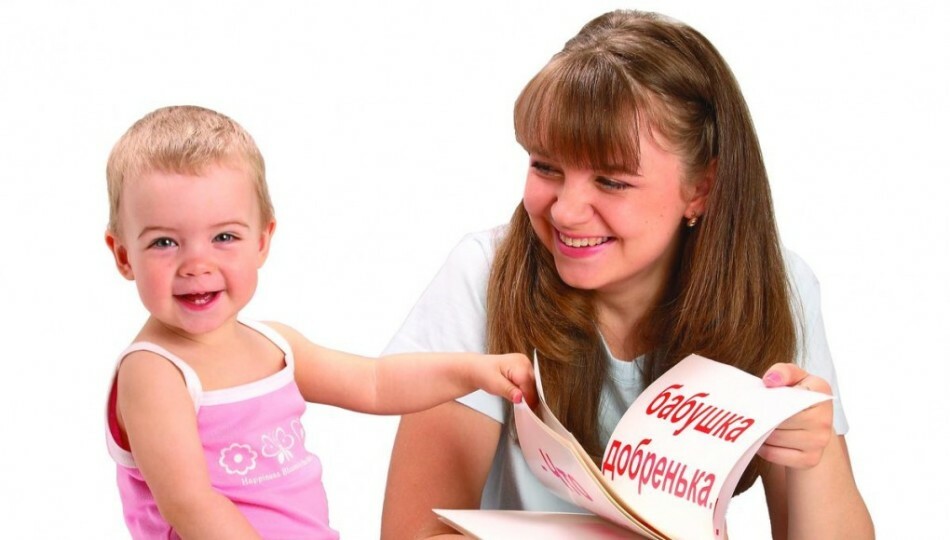 mother deals with a child
mother deals with a child It should be remembered that there are no examples in the medical practice of a healthy child who is in society not talking. Sooner or later this moment will come, regardless of whether they are engaged with the child additionally or not.
However, children, whose speech development has been given proper attention, begin to speak faster, build sentences more correctly, do not distort words much, have a richer stock of words, which means that in the future they are unlikely to encounter catching up when preparing for schooladditional time for the development of other intellectual abilities.
How to properly develop a child's speech: reminder
In order to facilitate the task of the child in learning new words and applying them correctly in practice, one must adhere to the following principles:
1. Beginning from the very beginning
It means from the very birth of the child,being pregnant. Do not be afraid that you have already missed something, it's not about special classes, the main thing is simple communication, eye contact. It is unlikely that there will be a mother who has not talked with her baby since the day he was born, and many start even long before
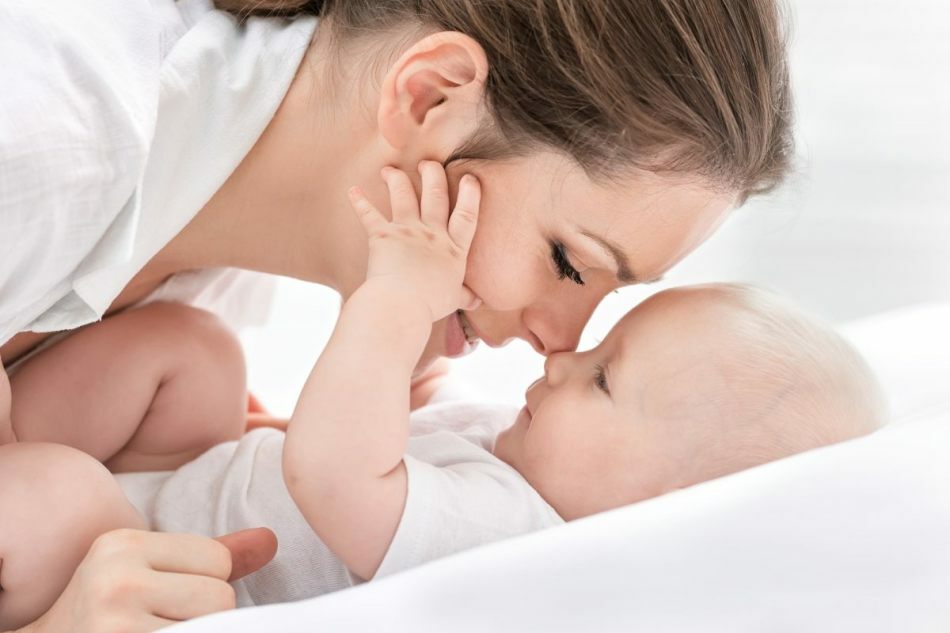 mom with a crumb of
mom with a crumb of 2. Develop a habit of commenting on everything do and see
Sociable by nature or by dutypeople will not be difficult to find a constant subject of conversation with the child, the more silent will have to develop these skills a little in themselves
3. Play with your intonation
At first the child is able to understand only the difference in your intonation, Do it to attract the child's attention to his speech
4. Use the high voice of
It is proven that children respond better to a high voice. Many women intuitively switch to a more squeaky voice when communicating with their child
5. Saying slowly, repeating several times
Obviously, with a quick indistinct speech the child just does not catch the meaning of the words and in the future may mispronounce them
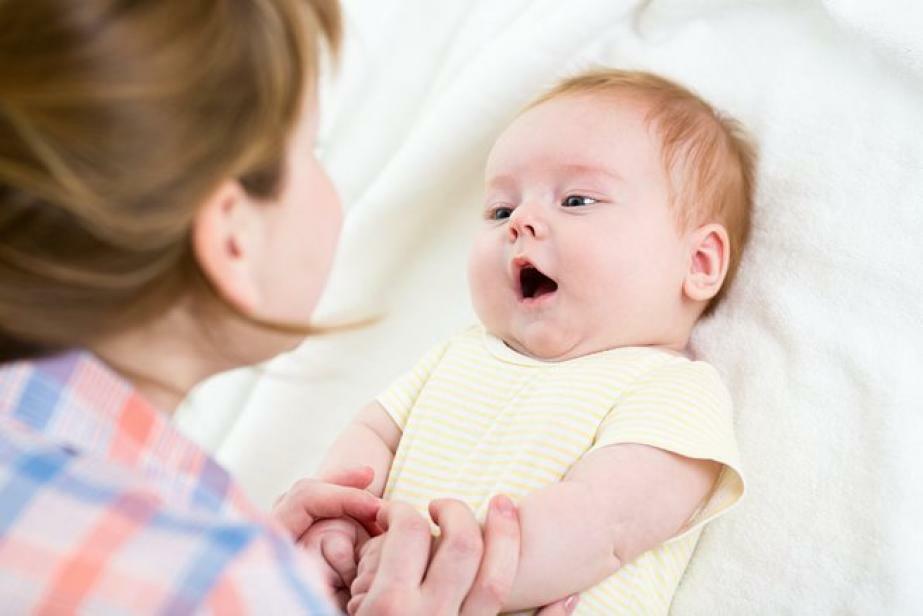 the walking of an infant
the walking of an infant 6. Simplify the words and sentences of , but do not get carried away with the alteration of words and the "lisp" of
. At first, it will be difficult for a child to learn complex terms and long words, so the technique of reducing and simplifying speech can be effective. For example, instead of the word "dog" you can say "gav-gav", or explaining to the child why you can not touch the socket, you should not talk about the essence of electricity and the tension in the network, you can just say "it's impossible, it will hurt"( or "bo-bo"").But do not deliberately distort the words, especially after a year, like "do you want to sit down for a classy masya?"
7. Enrich your speech with the child gradually, adding new words, clarifications and additions
For example, you can first say "Masha keeps a bear", then add "Masha keeps a big furry bear. Bear likes honey »
8. Avoid background when communicating with
Many background sounds( for example, TV) can confuse the child, do not allow to fully concentrate on you and on what you say to the baby
9. Pay attention to the fine motor skills of the hands
It is proved,that the development of nerve endings on the fingers and palms of the hands is directly related to the development of speech. Therefore, it is so important to stimulate the child's many-sided tactile sensations( hand massage, finger games, small items, touching surfaces)
How to develop a child's speech in the first year of life?
 mother plays with a baby
mother plays with a baby In the familiar adult world,with the help of words, the child will begin to speak only in the second year of life. Speech, however, consists of two components: reproduction and understanding( perception).
IMPORTANT: Children begin to understand the meanings of words much earlier than they learn to pronounce them.
In other words, the child during the first year forms the so-called passive baggage of words. And in the second year, as a rule, it takes him to the status of active, i.e.begins to use these words in his speech.
It is very important to help your child learn as many words as possible, while establishing certain connections and associations of words with real objects or actions.
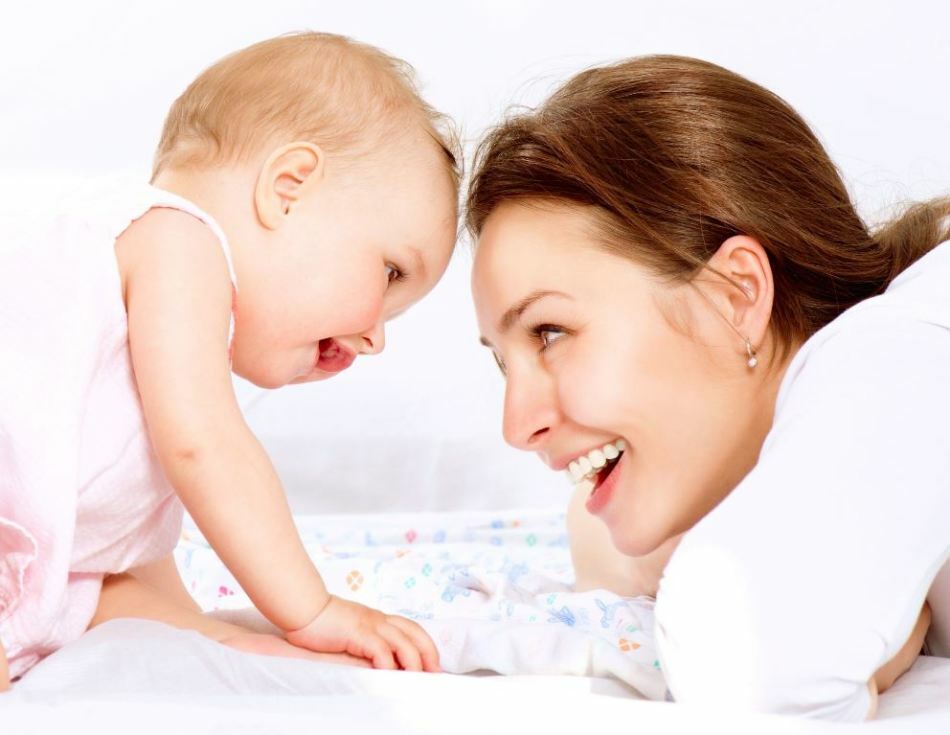 mother communicates with the baby
mother communicates with the baby Given that the child in the first year is developing very rapidly, we will consider the main stages of the child's speech development in the first twelve months.
- 0-3 months
The child communicates with crying or screaming, well captures the intonation of your voice
- 3-6 months
The period of "walking".It is at this age that a child in a good mood can enjoy the sounds of "aga", is able to pronounce many vowels and some consonants. An important feature is the ability to enter into a dialogue with the child, to speak with pauses, giving the child the opportunity to respond. It is possible to encourage the baby by repeating the sounds of
IMPORTANT: Approximately up to 4-5 months, children do not understand the meanings of words, but interpret your speech by intonation.
- 6-9 months
The phase of babbling. After six months of age, many parents are able to catch the words "ba-ba", "pa-pa", "ma-ma" in a chaotic leap. At the very beginning, this is only a set of syllables alternating in different sequences. At this stage, you can actively teach the child words, calling the objects surrounding him
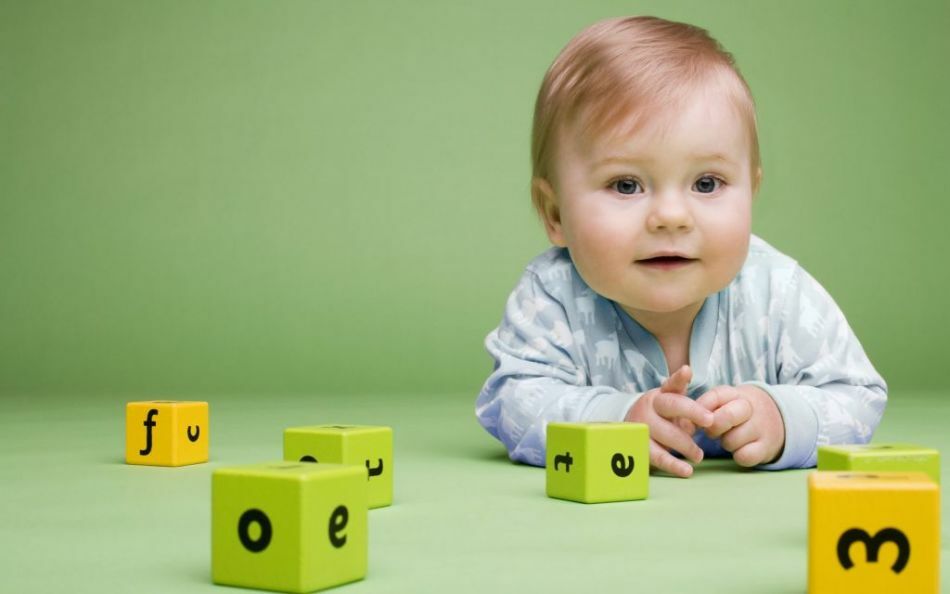 child with dice
child with dice - 9-12 months
By the end of the first year the child says his first words. Some children are able to pronounce up to 10 words. But everything is individual, and depends, including on the temperament of the child. If you are not talkative by nature, it is unlikely that your child will begin to babble incessantly
Separately, one should mention the methods of early development of the child. The desire of parents to grow a capable child, smarter and more successful than himself, it is quite natural. But in a fit of best intentions, it is important not to achieve the opposite result. The life of the child of the first year is connected, first of all, with the emotional side. Therefore, vital sensual communication, rather than mechanical memorization of words from cards, should be paramount, to show which children recommend from the first days of life.
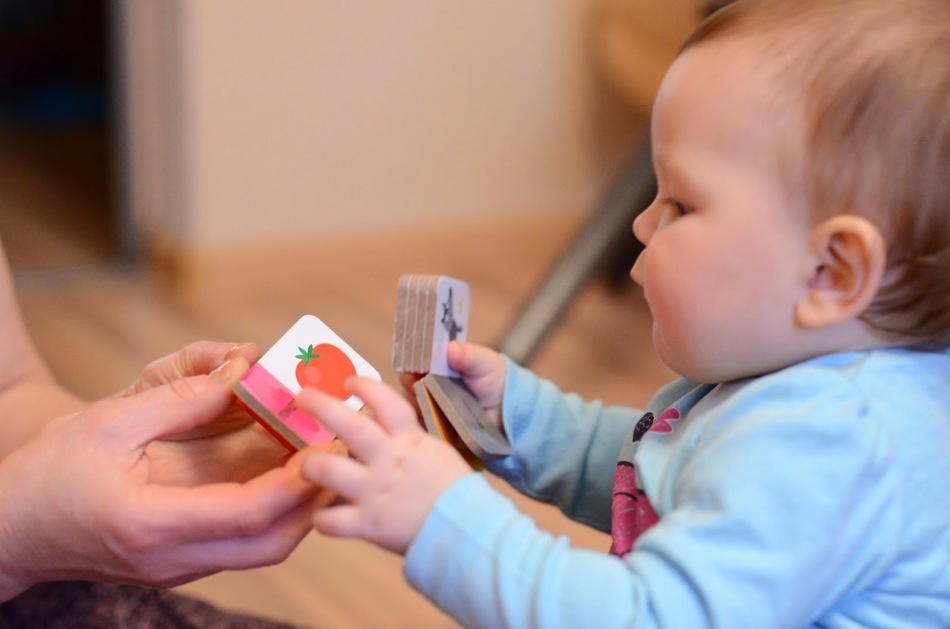 the child looks at the pictures
the child looks at the pictures A number of techniques really show high results: children know a lot of words, begin to read and write earlier than to speak. But often they have problems with communication, emotions, social and personal life in the future. Therefore, everything needs to be approached reasonably and guided first of all by the desire and interest of the child.
The main techniques of speech development in children of the first year are:
- sound imitation to the child
- commenting on what is happening
- songs, nursery rhymes, finger games
- development of fine motor skills
Songs, rhymes and rhymes for speech development in children 2 - 3 years
This is perhaps the mostEffective, generation-tested ways of communicating with young children.
Basic principles:
- simple rhyme
- repetition of sounds or words
- small size
- accompaniment with gestures / actions
Rhyme rhymes can be told, or you can hum, using various melodies.
The main goal of nursery rhymes, finger games, rhymes:
- emotional contact with the child
- development of his speech skills
- finger massage
- body parts study
- help in establishing the
regime For example, repeating the same rhyme before a night sleep,a funny poem and an understanding that it's time for him to sleep.
IMPORTANT: Young children need to follow a sequence of actions and order, as this develops a sense of stability and security.
You can think up or choose from a variety of available nurseries one by one for different occasions:
- morning hygiene procedures
 wash washstick
wash washstick - disguise of a child
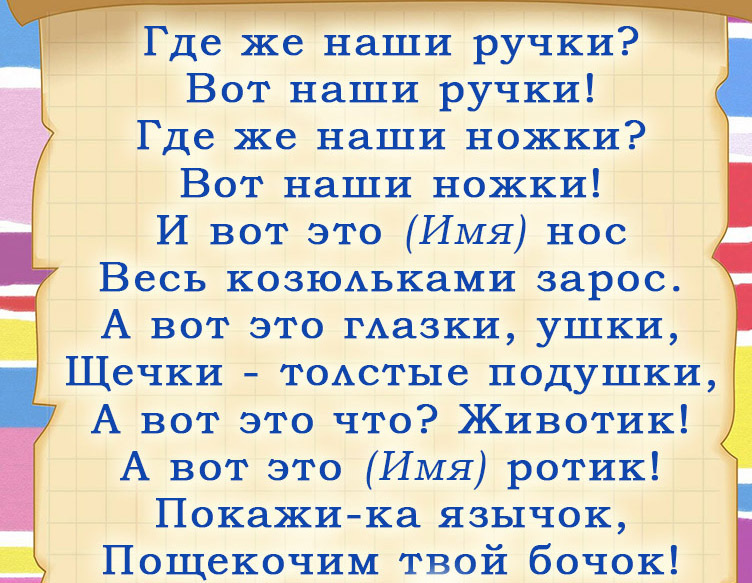 rhyme when changing clothes
rhyme when changing clothes - bathing preparation
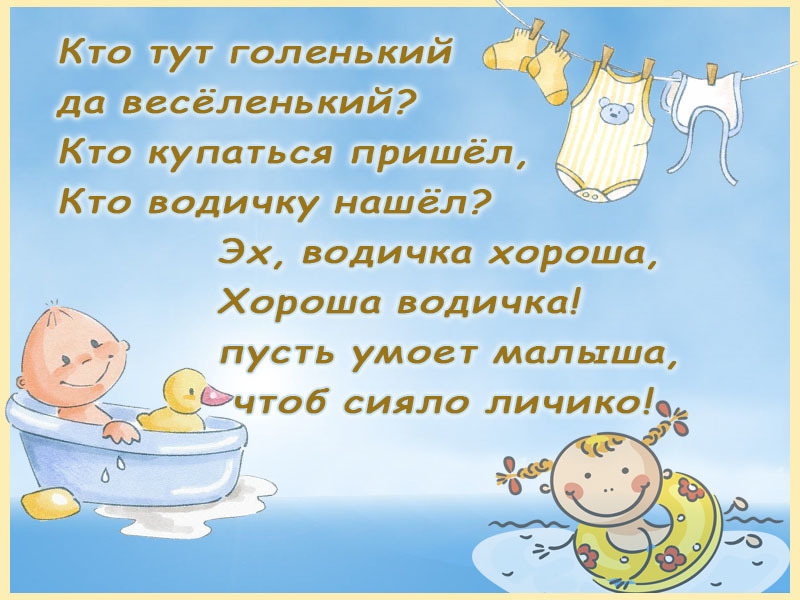 bathing rhythm
bathing rhythm - before gymnastics
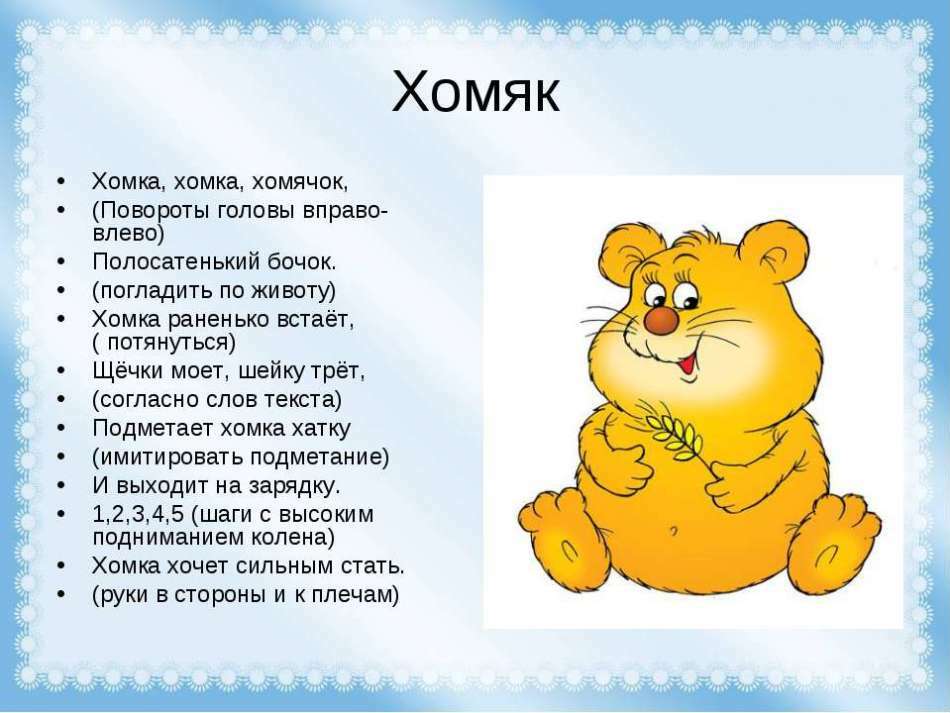 rhythmic gymnastics
rhythmic gymnastics - finger massage
 rhymefor massage fingers
rhymefor massage fingers - before going to sleep
 rhymes for the night
rhymes for the night Will please the baby and will be useful and classic poteshki "ladushki", "cockerel-scallop", "goat horned", "soroka beloboka "and many others.
How to develop a preschooler's speech: advice, recommendations
The peak of speech development is usually observed in children in the second-third year of life. As a rule, at the age of about a year the child begins to walk, and the breakthrough in physical development is replaced by a language breakthrough. Parents can certainly stimulate their child to develop speech using the following techniques:
- Joint reading of fairy tales and their discussion
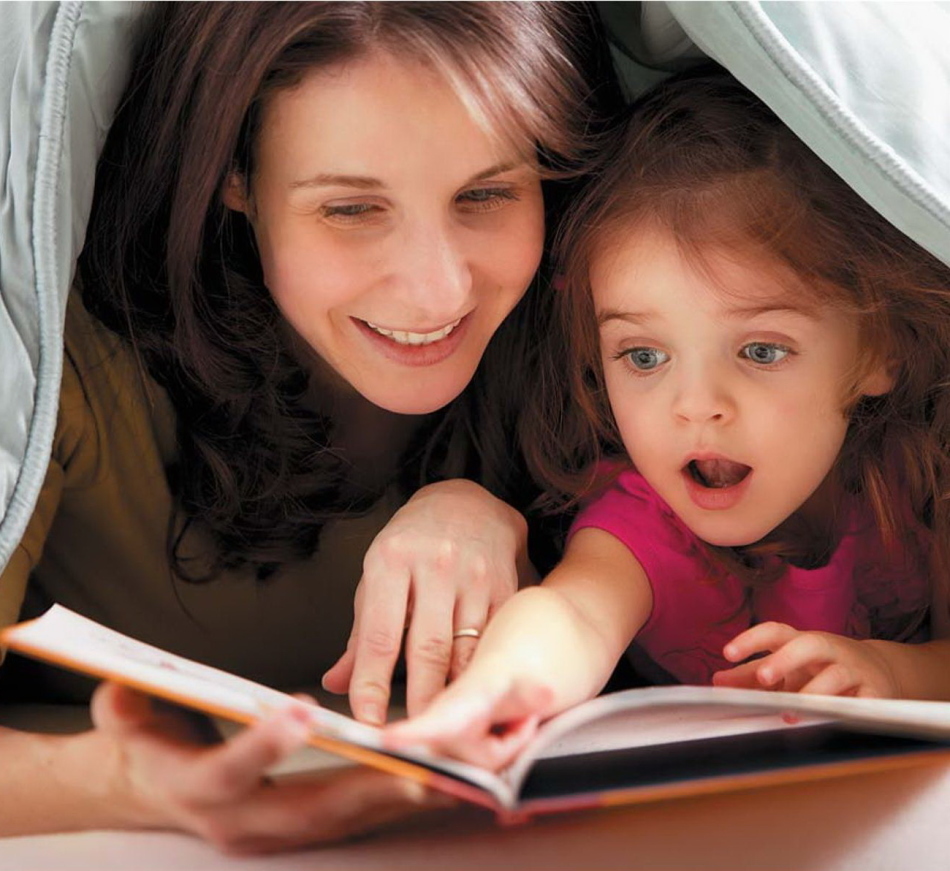 reading fairy tales
reading fairy tales - Linking pictures to real objects
Showing a child a particular picture in a book, try to find her counterpart in the real world andSpecify the child for the similarity
- Clarification and correct repetition of the of the child's words
If the child points at the subject and says it is not entirely correct, do not point out the error, you need to agreesitsya and repeat correctly. For example, a child said "flap", you should answer: "yes, this is a machine"
- Suggestion for choosing
When offering a child something, expand his vocabulary by providing an alternative. For example: "Do you want an apple or a pear?", "Are you going to drink from a mug or a glass?"
- Word games
Playing with a toddler, always accompany your activities with the words
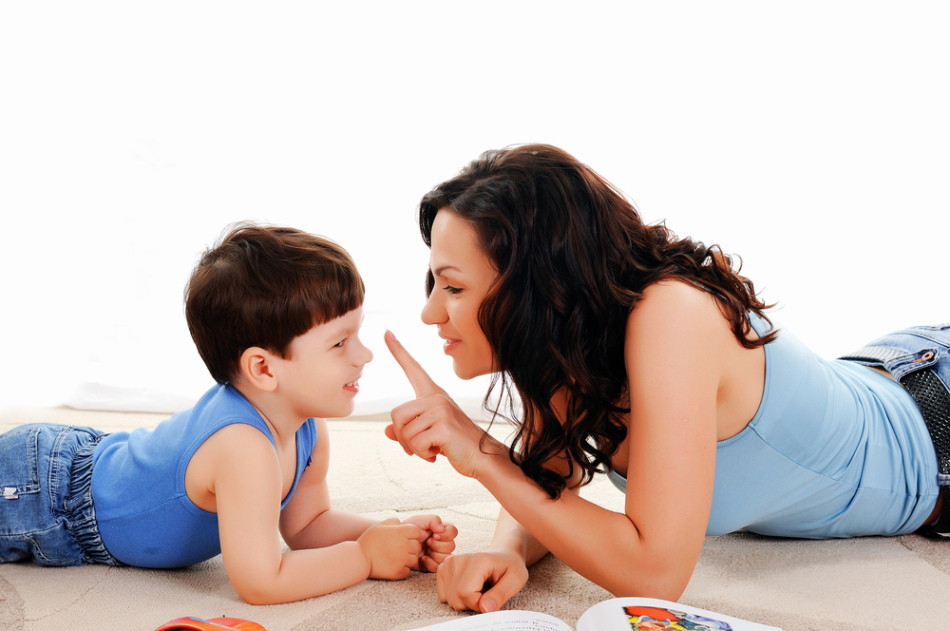 game mom with son
game mom with son - Sounding what the child does and feels like
Try to pronounce everything that the child does with simple simple sentences, including describe his feelings, for example, if it hurts, or is hot or cold.
- Commenting on your actions
- Referring by name, eye contact
More often refer to the child by name, do not forget to look into the eyes of the kid so that he understands that the appeal is addressed to him.
- Using gestures
First time gesticulation is an indispensable thing for mutual understandingmania and learning the child's words, so duplicate all words and actions with appropriate gestures. Soon the child will begin to associate them with the words
- Muscle training
To train the muscles of the speech device, you can buy a child a whistle, a pipe, a harmonica, and a little later start practicing with the baby articulatory gymnastics
- Reading by roles
If you regularly told the child the same rhymeor poteshku, he quickly learn her words, so in time you can read the verse, breaking the lines by roles, as if answering each other. A good example for this is the dialogue "Geese-geese, ha-ha-ha"
 communication of the mother and daughter
communication of the mother and daughter - The detailed definition of the properties of the object
It is important not only to name the object, but also to tell a little about it. For example, when showing a book to a kid, you should also demonstrate that the book can be flipped, opened and closed
- Reply with
When the child starts asking questions: "what is this?", "What's that?", It will be easier for him to remember the name andthe meaning of a word, if you give a short description of an object from words that it already knows. For example: "it's a truck, it's carrying large items" or "it's a teapot, it's brewed hot tea"
- The expression of a misunderstanding of the child who knows but is lazy to pronounce the words out loud
You can intentionally not immediately fulfill the whim of the child if he knows how,but does not voice the request, but merely points with his hand. Alternatively, you can offer the child a deliberately wrong object, as if you did not understand it, and only with a third time give him what he wants.
IMPORTANT: Children at this age almost every day learn a new word. You can lead the so-called magazine "Word of the day" and record every day a new word pronounced by the child. This will follow the development of the speech of the baby.
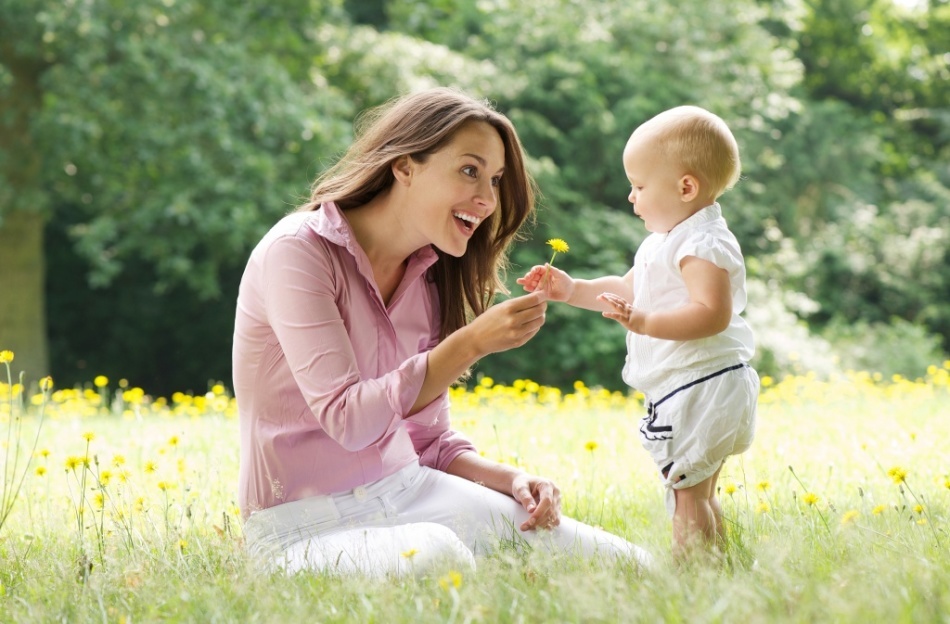 child with mother in nature
child with mother in nature In any business, the main thing is to practice a lot, so communicate with your child always and everywhere: at home, walking in the park, on the way to the clinic, shopping at the store.
But one should not impose a companion on a toddler when he is tired, wants to sleep or eat, the development of speech should not also look like a task strictly in time. It is important to learn to speak during the game, during daily daily rituals of the child or on a walk, when the kid himself is actively looking for communication.
Play and learn to talk: story-role games for children
The options for games with the child are limited only by the imagination of the parents. At the same time the kid often prompts himself what he wants to do, distributes roles and organizes the game.
Your mission is to fill the game with deployed dialogs, so that the game was not only fascinating, but also useful for the development of speech crumbs. It can be:
- Hide and Seek
The classic game "ku-ku" with babies, can gradually change. You can hide behind anything, involving the child with the words "where's Mom?", "Find Mom".As you grow up, the child will begin to hide with pleasure himself, and you will look for him with the appropriate verbal accompaniment.
- Story-role games
At first it can be quite simple games. For example, you can play with a toy phone, a child can call your mom, dad, brother, sister, say "allo", find out "how are you?" And vice versa. Then you can play fairy tales by roles, come up with stories yourself, using household items and toys
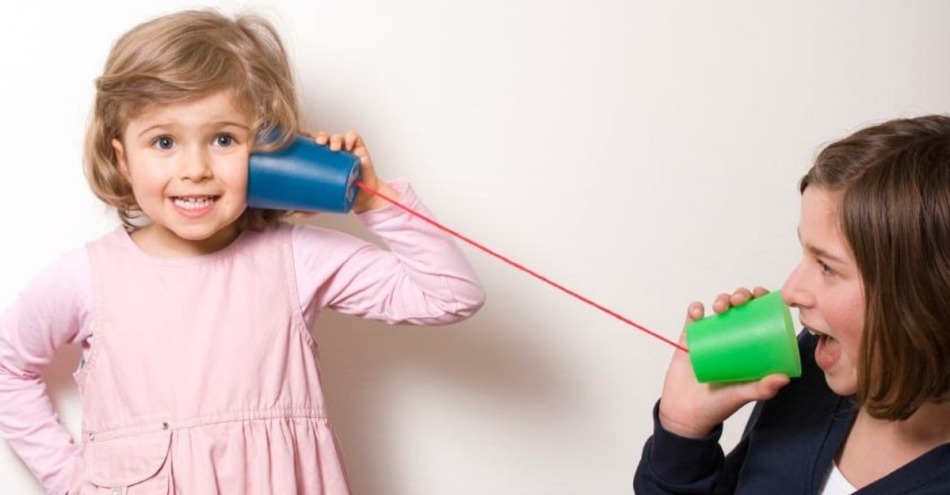 mom plays with daughter
mom plays with daughter - «Guess-ka»
There are many variations of games. You can ask the child: "guess what I'm doing?" And show some action: comb, pour tea into cups. Or ask: "guess who I am?" And portray a bunny or bear cub. You can show soft animals and ask: "guess who it is?", "What does he like to eat", "where does he live?".If the child can not respond, you should give a detailed answer yourself, and after a while, repeat the questions to the child.
- Active games
You can use the pots and songs in an active game with the child, encouraging him to repeat the corresponding actions together with the words. This in parallel with the speech skills will allow to develop both the physical and musical abilities of the child. Examples:
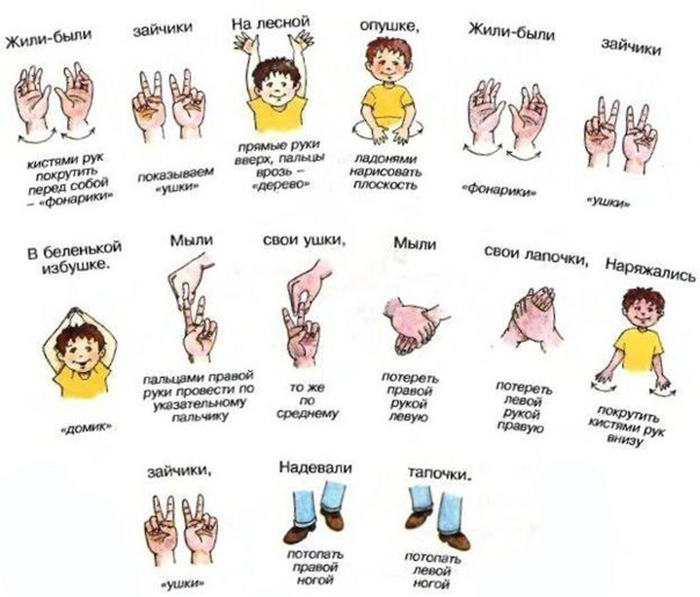 poteshka with movements 1
poteshka with movements 1 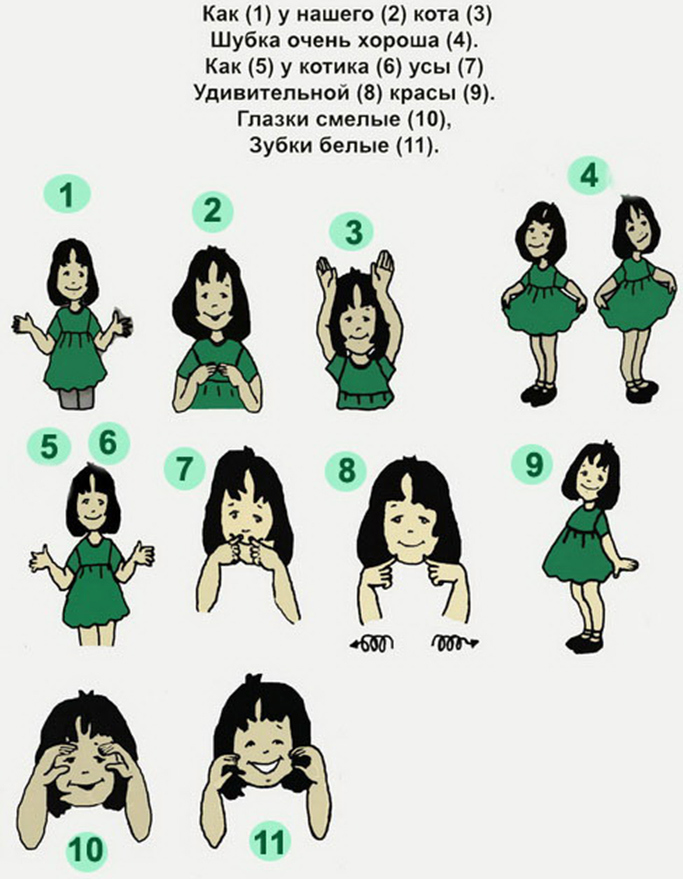 poteshka with movements 2
poteshka with movements 2 Why the child says ill: causes
According to the averaged indicators, a child by the age of 18 speaks 10-15 words, to two years - 30-50 words, to three years - hundreds of words, tofour thousand.
The main alarms caused by parents are related to the fact that the child:
- says little
- says wrong
As a rule, children do not immediately learn the right speech, including shorten words, skip sounds, confuse words, incorrectly build sentences. This is quite normal, since the baby first learns to speak simple, easy-to-remember words, often pronounces not the name of the object, but the sound with which it is associated. For example, not a machine, but a "bi-bi", did not fall, but a "bang".
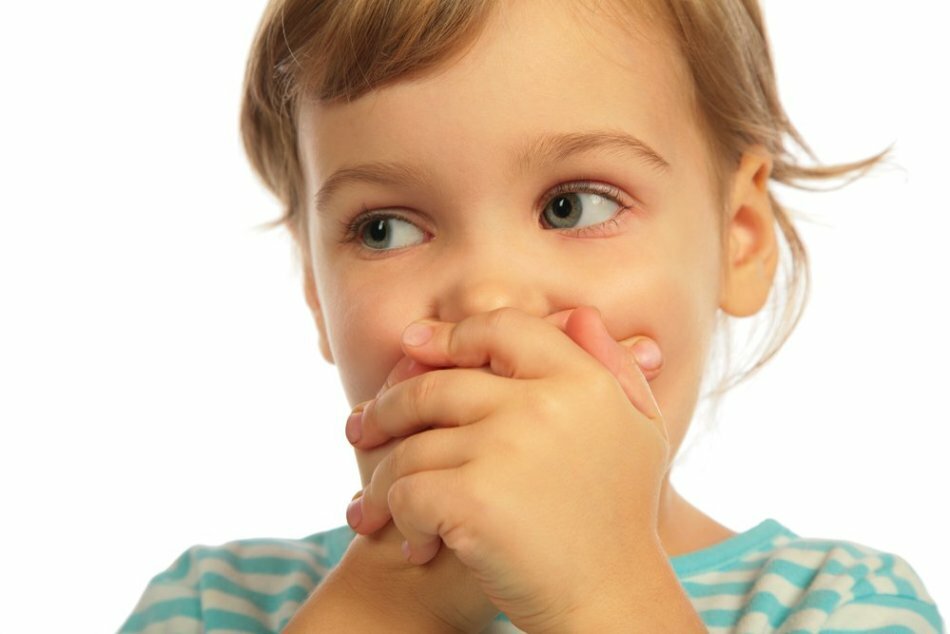 child does not want to speak
child does not want to speak In addition, it is natural to generalize many subjects and actions in one word. For example, the word "mom" will sound from the mouth of the child, and when he wants to handle, and when he wants to eat, and when he needs something from his mother. Gradually the child will begin to add the necessary clarification. The word "machine" or "bi-bi" can refer to a bicycle, and to a bus, and to everything that moves.
However, it is important not to miss the moment if the development of the child's speech will have problems:
- limited stock of words
- stuttering
- lisp
- loss of letters
If a child in 2.5-3 years old knows less than 30-50 words,lisping or stuttering, you should see a doctor. Timely adjusting the speech development, the peak of which is observed before the age of three, you can avoid serious problems in the future.
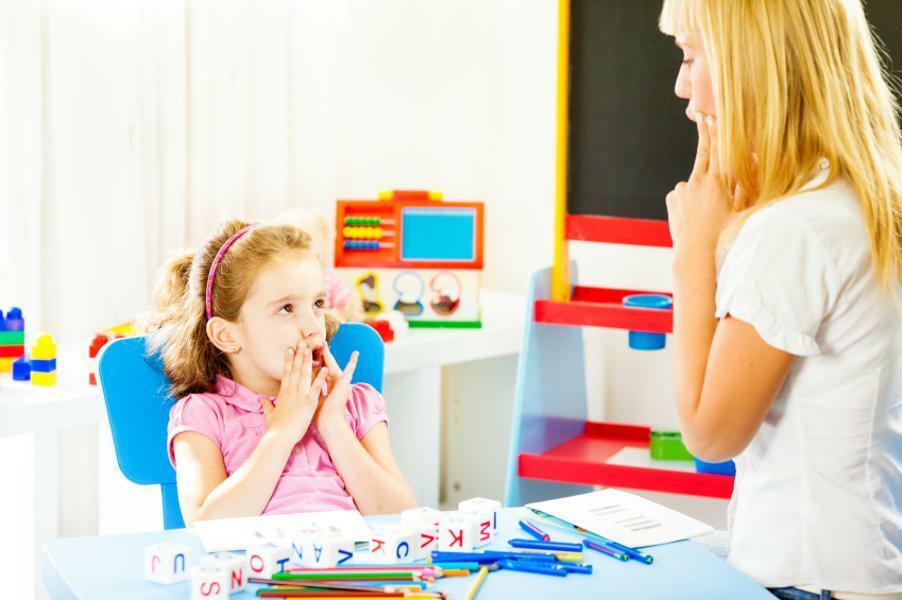 the child deals with the speech therapist
the child deals with the speech therapist The main reasons why the child does not speak or speaks the wrong way:
- He is understood and without words
The kid is just too lazy to pronounce words because it is perfect without them. In this case it is necessary to be cunning that you do not understand what the child wants and force him to say it - There are hearing problems
There may have been a sulfur plug or there are other obstacles to normal hearing - Fast paced speech
The kid is too rushed to pronounce words,which leads to loss of letters or stuttering. Usually it goes to 4 years. - Imitation of the wrong sounds.
. The child imitates sounds and words that hears from people around him. You should follow your speech, the correct pronunciation of words and the construction of phrases
IMPORTANT: When evaluating the development of a child's speech, focus not on pronunciation, but on the child's ability to use his vocabulary in various forms of sentences.
By the age of 3 years the child should make sentences of 3-4 words, while using different forms of verbs, declensions, faces, cases. If this is not the case, consult a pediatrician who will refer the child to a lor or speech therapist if necessary.
Work on the correct pronunciation: exercises, articulatory exercises in pictures
In order for the child to quickly learn the correct pronunciation of words, and you did not have to contact a speech therapist, there is a so-called articulatory gymnastics.
Regular exercises with a child constantly confusing and mispronouncing sounds will lay the groundwork for a correct and beautiful speech in the future.
It is better to train the muscles of the tongue, palate, lips, throat and cheeks in front of the mirror.
Exercise examples:
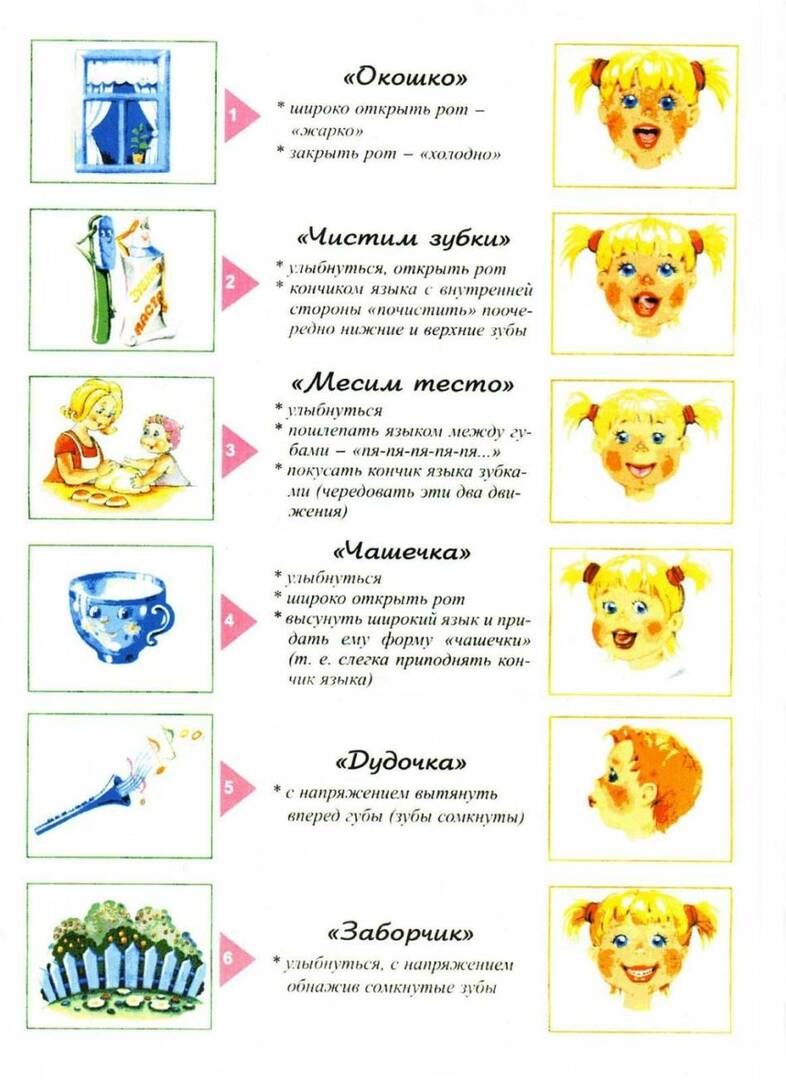 articulatory exercises 1
articulatory exercises 1  articulatory gymnastics 2
articulatory gymnastics 2 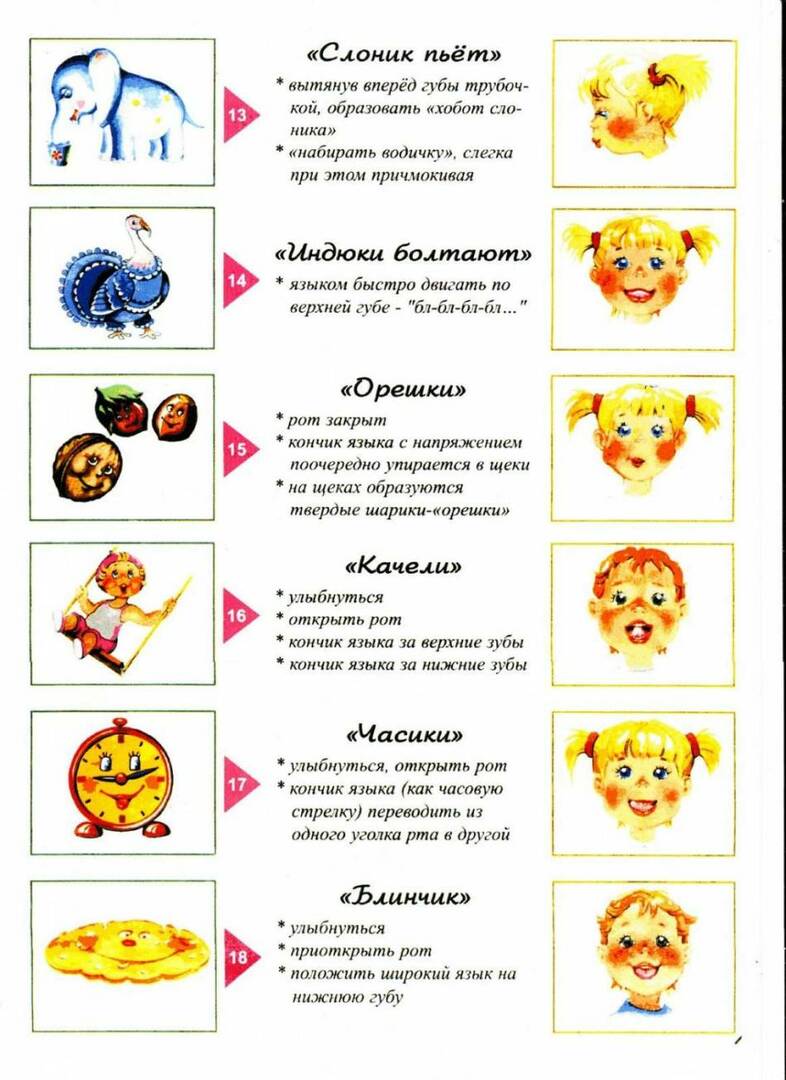 articulatory gymnastics 3
articulatory gymnastics 3 You can dilute classes by including funny rhymes, movements and grimaces in them. For example:
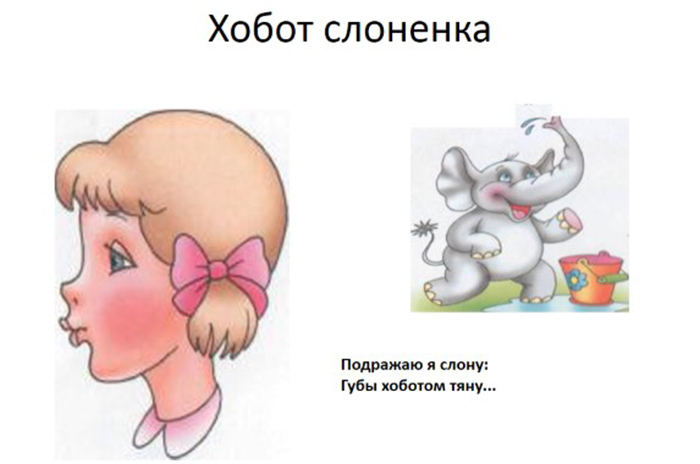 rhyme for articulation 1
rhyme for articulation 1 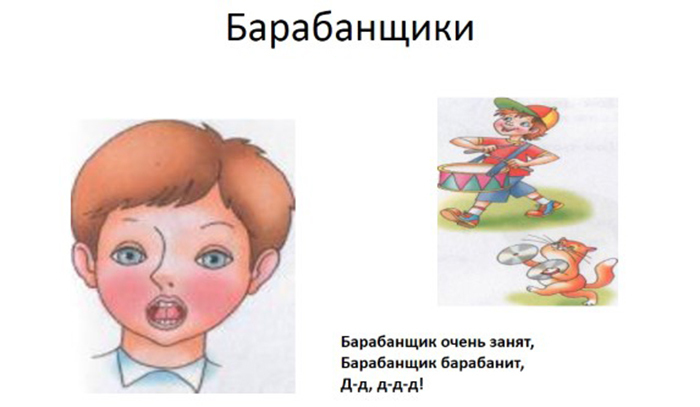 rhyme for articulation 2
rhyme for articulation 2 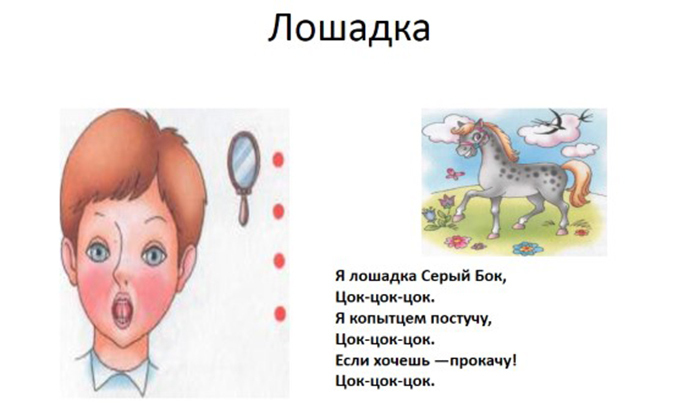 rhyme for articulation 3
rhyme for articulation 3 How to develop speech in school age children: advice, recommendations
At this age, there is a further improvement in speech, the child learns to think logically and express his thoughts consistently, learnsdescribe, compose, explain, argue, argue and persuade. For this, the child needs to still enrich his vocabulary, learn to analyze, beautifully express thoughts. It should be noted that this is also a period of development of written speech.
 communication with parents
communication with parents The main ways of developing speech at school age can be:
- writing a story using answers to questions
for example, for a story about an animal, you can prepare for the child such questions: who?what colour? How does it look?where does he live?than eat? What is the purpose? - writing a story on a series of pictures or photos
- writing one picture
- reading books
- expanding the horizon of a child, attending various activities, staying in nature
- revealing the creative side of a child
- versatile communication
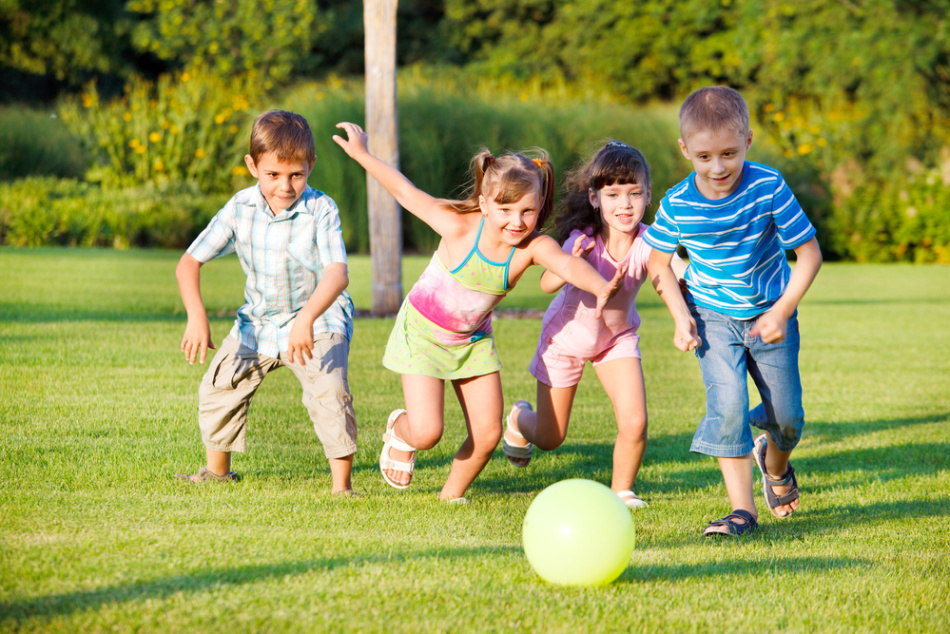 communicating with peers
communicating with peers Currently, there are a huge number of circles, sectionsand special groups for the development of the child, preparation for school, language learning and others. If there is an opportunity, of course, you can send the child to experienced professionals. However, this does not exclude the need for parents to participate in the development of their child. The child can achieve truly great success if he is surrounded by the attention and warmth of the closest people. Daily positive emotional communication with his child is the key to the formation of not only the correct and beautiful speech of the child, but also a strong, close-knit family.
